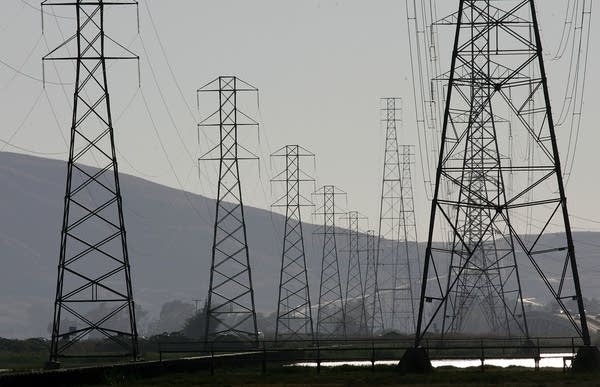Lawmakers aim for 2007 "energy session"

Pawlenty signed the bill flanked by a bipartisan group of lawmakers at the University of Minnesota. The bill signing took place at the University to highlight the institution's research on renewable fuels.
The crowd of observers included officials with utility companies, businesses and environmental groups. Pawlenty and the lawmakers were downright giddy as they traded jokes and shook hands before the bill signing, but then the governor became serious.

"This bill puts Minnesota at the head of the pack in the nation in terms of renewable energy. If it's not the most aggressive renewable energy standards, it's one of the most aggressive," Pawlenty said.
The new law requires that utility companies produce at least one-quarter of their power from renewable sources, like wind or solar power, and other clean fuels by 2025.
Create a More Connected Minnesota
MPR News is your trusted resource for the news you need. With your support, MPR News brings accessible, courageous journalism and authentic conversation to everyone - free of paywalls and barriers. Your gift makes a difference.
Under the law, utilities can buy renewable energy credits from other utilities to help meet the new standard. But the state can also force them to build new facilities or pay fines if they don't meet the standard.
The law allows regulators to delay or modify the requirement if it will cause a significant cost increase to rate payers.
Pawlenty suggested that Minnesota's new law will be seen as part of a turning point in the nation's energy policy.
"This bill puts Minnesota at the head of the pack in the nation in terms of renewable energy."
"Much of what we're doing now will be viewed 50 years from now as a Model T. The technology, through the wonderful work of the university and many other places across the country, is in a good form. But it will be dramatically, and I would say exponentially better, in five years and 10 years and 15 years and 20 years," said Pawlenty.
But for Pawlenty and many lawmakers, this is just the first of a series of energy issues they hope to address session. There are proposals that call for the reduction of greenhouse gas emissions, greater conservation and a larger investment in biofuels.
Rep. Maria Ruud, DFL-Minnetonka, is the chief author of a bill aimed at reducing carbon emissions. The bill would forbid the the construction of new coal burning power plants in Minnesota. Ruud says it also would call on the state to determine the best way to dramatically reduce greenhouse gas emissions over the next 40 years.
"We want to start moving that level down. That's a gradual process," said Ruud. "It directs the PCA and the Department of Commerce to develop a plan that would to reduce carbon emissions."

There are also bills that emphasize energy conservation. One proposal would require utilities to reduce their retail sales by 1.5 percent a year beginning in 2012. It would also require the state to help low-income Minnesotans make their homes more energy efficient.
Another proposal focuses on the next generation of biofuels. The bill would provide $28 million in incentives and research funding to develop ways to convert native prairie grass to ethanol. Lawmakers who are pushing the idea say it would be cheaper to produce, and more environmentally friendly, than corn-based ethanol.
Rep. Aaron Peterson, DFL-Appleton, is optimistic all of these measures will become law this year. He says he hopes historians remember this year as the energy session.
"I think 2007 can be the year for energy in Minnesota. I think the leadership supports it. I think Governor Pawlenty has made it clear. We have the expertise in the room and we have the expertise of the generation coming in Minnesota who will replace those who gave advice for many many years," said Peterson.
Many of the bills would also ensure that the proposals don't cause utility bills to skyrocket. The so-called "off ramps" would allow the Public Utilities Commission and other governing bodies to delay or modify the requirements if the costs are too significant for utilities and ratepayers.
